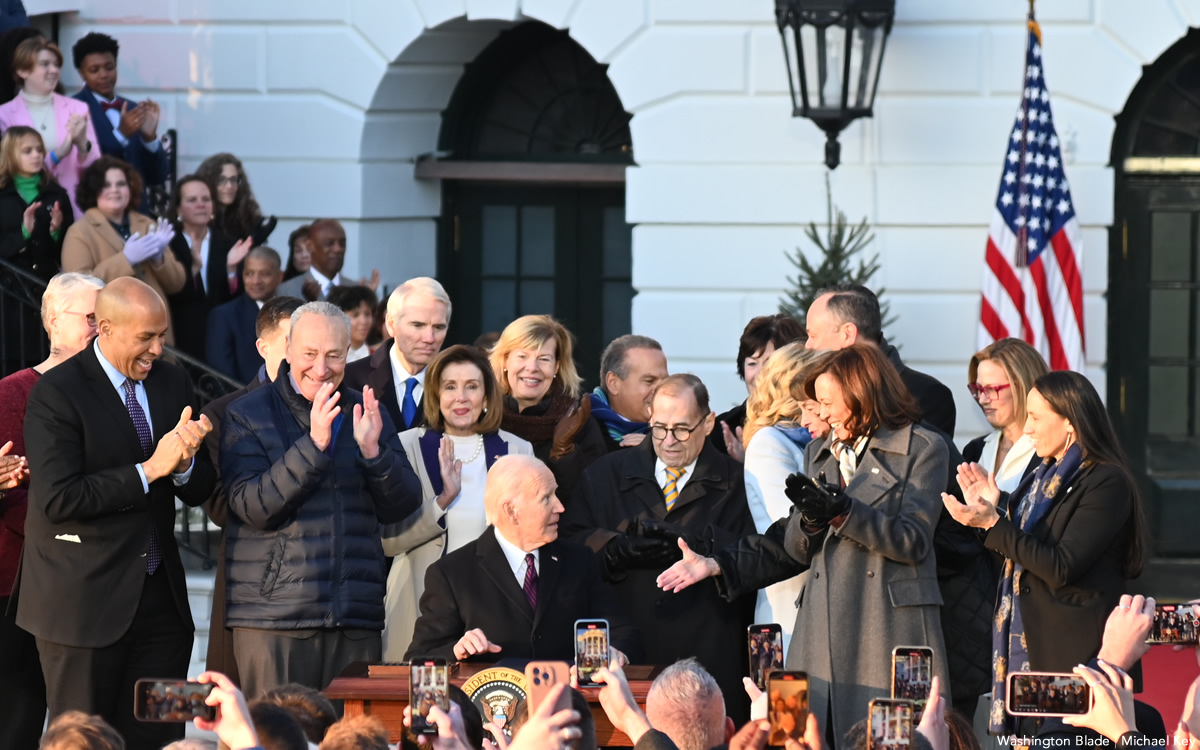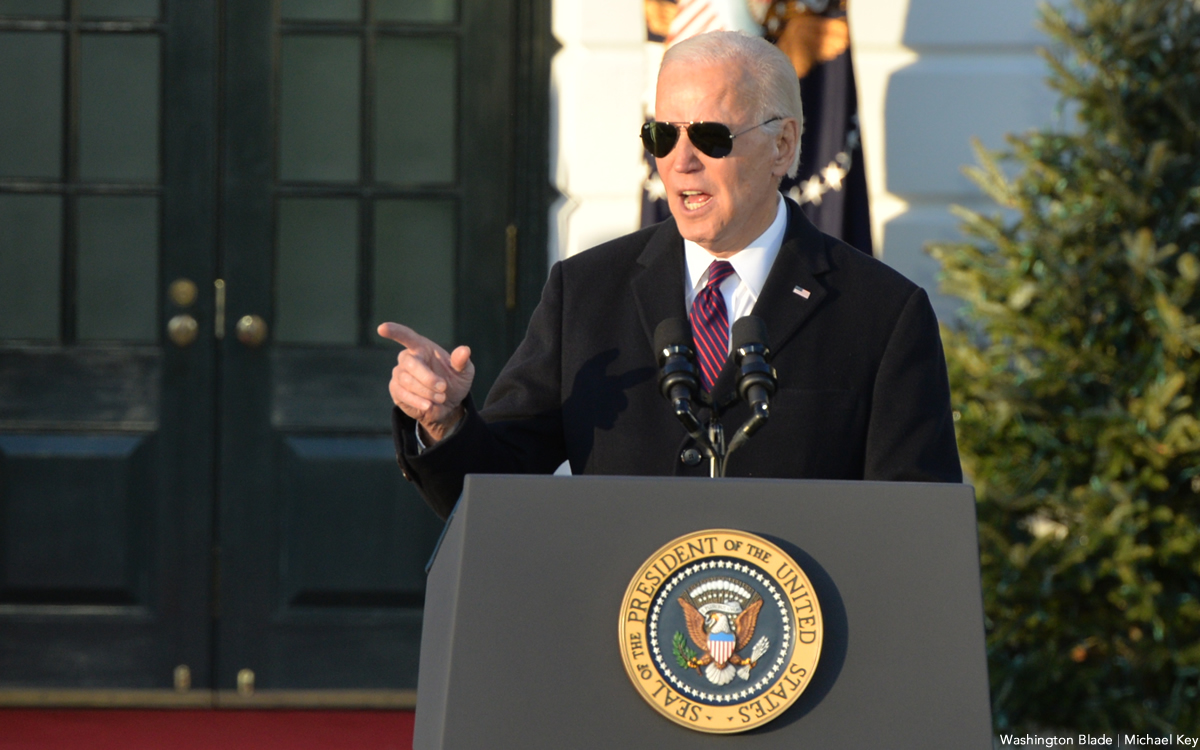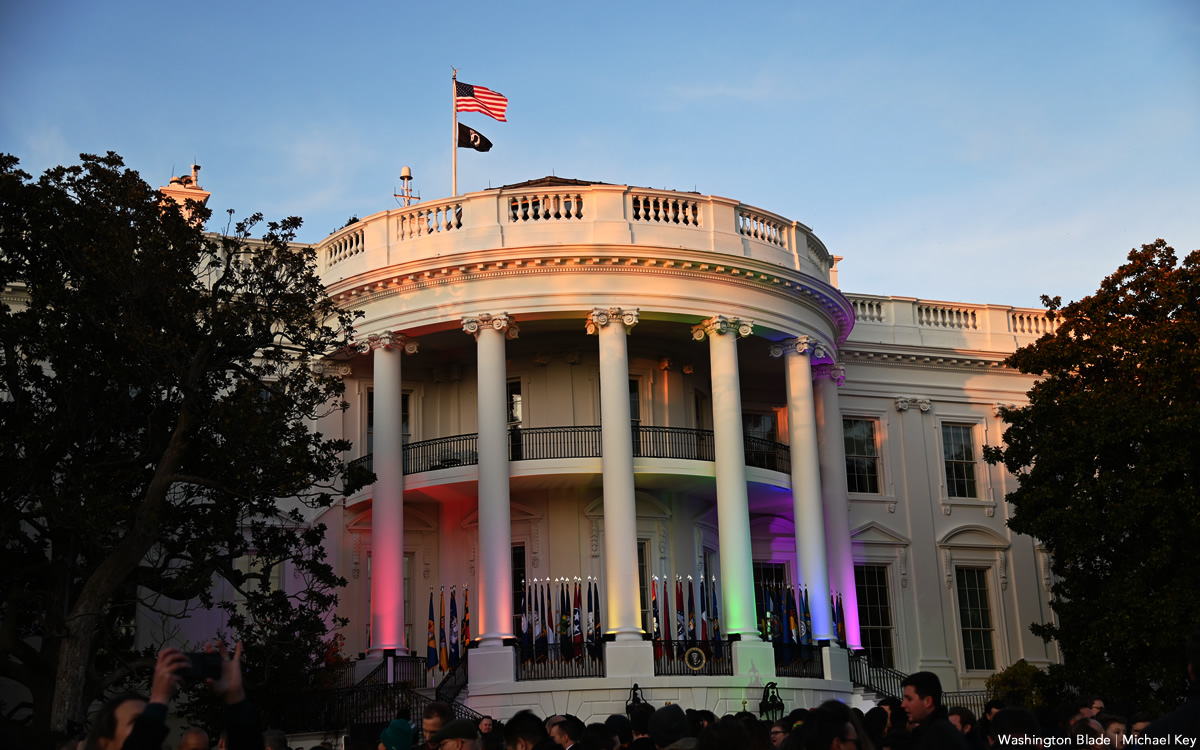The White House
Biden signs Respect for Marriage Act
Bill received final approval last week

President Joe Biden on Tuesday signed the Respect for Marriage Act into law.
“Today’s a good day,” said Biden during a signing ceremony that took place on the White House’s South Lawn. “Today America takes a big step towards equality.”
The ceremony took place five days after the Respect for Marriage Act passed in the U.S. House of Representatives with 39 Republicans voting in favor.
The bill passed in the U.S. Senate on Nov. 29 by a 61-39 vote margin. The Respect for Marriage Act first passed in the House in July.
Biden during the signing ceremony specifically thanked U.S. Sens. Tammy Baldwin (D-Wis.), Susan Collins (R-Maine), Kyrsten Sinema (I-Ariz.) and other lawmakers who helped secure the bill’s passage. Biden also reiterated calls for Congress to pass the Equality Act, which would add sexual orientation and gender identity to federal civil rights law, and for an end to anti-LGBTQ violence in the wake of last month’s massacre at Club Q in Colorado Springs, Colo., and the proliferation of anti-trans bills across the country.
“When a person can be married in the morning and thrown out of a restaurant in the afternoon, this is still wrong,” said Biden. “We must stop the hate and violence.”

Vice President Kamala Harris was San Francisco’s district attorney in 2004 when she became one of the first public officials in the country to officiate a same-sex wedding. Harris was California’s attorney general when she successfully challenged the state’s Proposition 8 before the U.S. Supreme Court.
The Supreme Court on June 26, 2013, struck down Prop 8 and the Defense of Marriage Act. The Supreme Court on June 25, 2015, issued its landmark Obergefell decision that extended marriage rights to same-sex couples across the country.
Harris noted Tuesday is “a day, when thanks to Democrats and Republicans, we finally protect marriage rights in federal law.” Dozens of same-sex couples who sued for marriage rights across the country and their families stood on the steps leading to the Truman Balcony as she and Biden spoke.
“For millions of LGBTQI+ Americans and interracial couples, this is a victory and part of a larger fight,” said Harris.
Supreme Court Justice Clarence Thomas in a concurring opinion he wrote in the decision that overturned Roe v. Wade suggested the Supreme Court should also reconsider Obergefell and two other decisions that guaranteed the right to private, consensual sex and the ability of married couples to purchase and use contraception.
The House first passed the Respect for Marriage Act less than a month after the Supreme Court overturned Roe in Dobbs v. Jackson. California Congressman Mark Takano, who is openly gay, earlier this month told the Washington Blade that Congress was “reeling” from the ruling and Thomas’ opinion and lawmakers said “we need to protect what we can.”
Harris said the Dobbs decision is a reminder that “fundamental rights are interconnected, including the right to marry who you love, the right to access contraception, and the right to make decisions about your own body.” Biden noted Congress passed the Respect for Marriage Act “because of an extreme Supreme Court has stripped away the right important to millions of Americans that existed for half a century.”
House Majority Leader Nancy Pelosi (D-Calif.); Senate Majority Leader Chuck Schumer (D-N.Y.) and Gina and Heidi Nortonsmith, one of the plaintiff couples in the lawsuit that led Massachusetts to become the first state in the country to extend marriage rights to same-sex couples in 2004, also spoke at the ceremony. Cyndi Lauper, Sam Smith and members of the Gay Men’s Chorus of Washington performed.
Transportation Sec. Pete Buttigieg; National LGBTQ Task Force Executive Director Kierra Johnson; Transgender Legal Defense and Education Fund Executive Director Andy Marra; David Mixner; Robyn Ochs; Alabama state Rep. Neil Rafferty; Pennsylvania state Sen. Malcolm Kenyatta; Arizona state Rep. Daniel Hernández; former New York City Council Speaker Corey Johnson; Maryland state Del. Luke Clippinger (D-Baltimore City); GLAAD President Sarah Kate Ellis; Garden State Equality (N.J.) Executive Director Christian Fuscarino; Equality Florida Communications Director Brandon Wolf; Wanda Alston Center Executive Director June Crenshaw and Japer Bowles, director of D.C. Mayor Muriel Bowser’s Office of LGBTQ Affairs, are among 5,300 people who attended the ceremony.
Sinema, Baldwin, Collins, U.S. Sens. Rob Portman (R-Ohio), Cory Booker (D-N.J.) and U.S. Reps. Jerrold Nadler (D.N.Y), Sharice Davids (D-Kan.) and David Cicilline (D-R.I.) were also in attendance.
“Today is a historic day and a much-needed victory for our community,” said Human Rights Campaign President Kelley Robinson in a press release. “It should be lost on no one that this bill signing comes less than a month after a deadly attack on our community in Colorado Springs, and at a time when the community continues to face ongoing threats of online and offline violence, as well as legislative attacks on our rights. In signing this bill, President Biden has shown that LGBTQ+ peoples’ lives and love are valid and supported.”
GLBTQ Legal Advocates and Defenders Janson Wu said “millions of couples and their children across the country now have the assurance that their families will continue to be respected by our state and federal governments because President Biden has signed the Respect for Marriage Act into law.” Equality California Executive Director Tony Hoang echoed these sentiments.
“This is an historic milestone for our movement and an important victory for hundreds of thousands of loving couples and their children across the nation,” said Hoang in a statement. “All Americans deserve the freedom to marry the person they love, and this bill is a reflection of the fact that for the majority of Americans — across all political parties, backgrounds, and in every corner of the country — the debate over marriage equality is settled.”

The White House
Hundreds protest ICE killing of Renee Nicole Good in D.C.
Married queer woman shot in Minneapolis on Wednesday

Hundreds of people took to the streets of D. C. on Thursday night to protest the killing of a U.S. citizen by a U.S. Immigration and Customs Enforcement agent.
Protests began at the busy — and increasingly queer — intersection of 14th and U Streets, N.W. There, hundreds of people held signs, shouted, and made their way to the White House to voice their dissent over the Trump-Vance administration’s choice to increase law enforcement presence across the country.
The protest, which also occurred simultaneously in cities large and small across the country, comes in the wake of the death of Minneapolis resident Renne Nicole Good at the hands of ICE Agent Jonathan Ross. Good left behind two children and a wife, Rebecca Good.
Records obtained by the Associated Press found that Ross was an Iraq War veteran and nearly two decades into his career with U.S. Border Patrol and ICE.
Good was gunned down just blocks away from where George Floyd was killed by police in 2020, sparking weeks of national protests. Minnesota officials say the FBI has blocked their access to an investigation into the fatal shooting, according to a BBC story published on Friday.
In the nation’s capital, protesters marched from the intersection of 14th and U Street to Lafayette Square, right outside the White House. Multiple D.C. organizations led the protest, most notably Free DC, a nonprofit that works to ensure the right of “self-determination” for District residents, as many local laws can be reviewed, modified, or overturned by Congress. Free DC had organized multiple protests since the Trump-Vance administration was elected.
The Washington Blade spoke to multiple protesters towards the tail end of the protest about why they came out.
Franco Molinari, from Woodbridge, Va., crossed the Potomac to partake in his first-ever protest.
“I don’t appreciate ICE and the use of federal agents being pretty much militarized against America,” Molinari said while holding a “Justice for Renee” sign. “The video of Renee being executed cartel style in her car was enough for me to want to come out, to at least do something.”
Molinari, like many others the Blade spoke with, found out about the protest on Instagram.
“It was my friend there, Sarah … had sent a link regarding the protest to a group chat. I saw it in the morning, and I thought, ‘You know what, after work, I’m head out.’”
He also shared why protesting at the White House was important.
“I already saw the response that the president gave towards the murder of Renee, and it was largely very antagonizing,” Molinari said.
President Donald Trump, along with federal leaders under him, claimed that Good “violently, willfully and viciously ran over the ICE officer.” The president’s claims have been widely discredited through multiple videos of the incident, which show Good was attempting to leave the scene rather than attacking the officer.
“I hope that anybody would be able to see that and see the response and see for themselves that it just is not correct,” Molinari said.
The Blade also spoke with leftist influencer Dave the Viking, who has more than 52,000 followers on TikTok, where he posts anti-fascist and anti-Trump videos.
“We’re out here to make sure that this regime can’t rewrite history in real time, because we all know what we saw … we’re not going to allow them to run with this narrative that they [ICE agents] were stuck in the snow and that that poor woman tried to weaponize her car, because we all saw video footage that proves otherwise,” he told the Blade. “We’re not going to let this regime, the media, or right-wing influencers try to rewrite history in real time and try to convince us we didn’t all see what we know we saw.”
Dave the Viking continued, saying he believes the perceived power of ICE and other law enforcement to act — oftentimes in deadly and unjustifiable ways — is a product of the Trump-Vance administration.
“There’s a line between fascism and anti-fascism. These motherfuckers have been pushing that envelope, trying to label an idea a terrorist organization, to the point of yesterday, crossing that line hardcore. You face the point of looking at history and saying there was this 1989, 2003 America, where we’re just going in, raiding resources. Where is this fucking 1930s Germany, where we’re going in and we’re about to just start clearing shit and pulling knots? Yeah, nope. We proved that shit yesterday.”
Two people were injured in another shooting involving federal agents, this time Border Patrol in Portland, Ore., on Thursday afternoon.
KC Lynch, who lives near American University, also spoke about her choice to protest with a group.
“I came out today because everything that ICE has done is absolutely unacceptable, not only killing this one woman, but also the fact that they’ve been imprisoning people in places that are literally, that have been literally on record by international organizations shown to be human rights violating. It’s unbelievably evil.”
Lynch also echoed Dave’s opinion about parallels between the Trump-Vance administration and the rise of Adolf Hitler in Nazi Germany.
“It’s literally what happened before the Holocaust. We should all be scared. We should all be angry. I’m so angry about it … even talking about it — I’m sorry,” she said before getting choked up.
Lynch emphasized that despite the circumstances in which people were protesting together, the sense of community was strong and powerful.
“I feel like it’s important for people to know that we’re angry, even if no policy changes come out of it, and it’s just nice to yell and be angry about it, because I feel like we’ve probably all been feeling this way, and it’s nice to be around people that are like minded and to like have a sense of community.”
The White House
‘Trump Rx’ plan includes sharp cuts to HIV drug prices
President made announcement on Friday

President Donald Trump met with leaders from some of the world’s largest pharmaceutical companies at the White House on Friday to announce his new “Trump Rx” plan and outline efforts to reduce medication costs for Americans.
During the roughly 47-minute meeting in the Roosevelt Room, Trump detailed his administration’s efforts to cut prescription drug prices and make medications more affordable for U.S. patients.
“Starting next year, American drug prices will come down fast, furious, and will soon be among the lowest in the developed world,” Trump said during the meeting. “For decades, Americans have been forced to pay the highest prices in the world for prescription drugs by far … We will get the lowest price of anyone in the world.”
Trump signed an executive order in May directing his administration “to do everything in its power to slash prescription drug prices for Americans while getting other countries to pay more.”
“This represents the greatest victory for patient affordability in the history of American health care, by far, and every single American will benefit,” he added.
Several pharmaceutical executives stood behind the president during the announcement, including Sanofi CEO Paul Hudson, Novartis CEO Vas Narasimhan, Genentech CEO Ashley Magargee, Boehringer Ingelheim (USA) CEO Jean-Michel Boers, Gilead Sciences CEO Dan O’Day, Bristol Myers Squibb General Counsel Cari Gallman, GSK CEO Emma Walmsley, Merck CEO Robert Davis, and Amgen Executive Vice President Peter Griffith.
Also in attendance were Health and Human Services Secretary Robert F. Kennedy Jr., Commerce Secretary Howard Lutnick, Centers for Medicare and Medicaid Services Administrator Mehmet Oz, and Food and Drug Administration Commissioner Marty Makary.
Under the Trump Rx plan, the administration outlined a series of proposed drug price changes across multiple companies and therapeutic areas. Among them were reductions for Amgen’s cholesterol-lowering drug repatha from $573 to $239; Bristol Myers Squibb’s HIV medication reyataz from $1,449 to $217; Boehringer Ingelheim’s type 2 diabetes medication jentadueto from $525 to $55; Genentech’s flu medication xofluza from $168 to $50; and Gilead Sciences’ hepatitis C medication epclusa from $24,920 to $2,425.
Additional reductions included several GSK inhalers — such as the asthma inhaler advair diskus 500/50, from $265 to $89 — Merck’s diabetes medication januvia from $330 to $100, Novartis’ multiple sclerosis medication mayzent from $9,987 to $1,137, and Sanofi’s blood thinner plavix from $756 to $16. Sanofi insulin products would also be capped at $35 per month’s supply.
These prices, however, would only be available to patients who purchase medications directly through TrumpRx. According to the program’s website, TrumpRx “connects patients directly with the best prices, increasing transparency, and cutting out costly third-party markups.”
Kennedy spoke after Trump, thanking the president for efforts to lower pharmaceutical costs in the U.S., where evidence has shown that drug prices — including both brand-name and generic medications — are nearly 2.78 times higher than prices in comparable countries. According to the Pharmaceutical Research and Manufacturers of America, roughly half of every dollar spent on brand-name drugs goes to entities that play no role in their research, development, or manufacturing.
“This is affordability in action,” Kennedy said. “We are reversing that trend and making sure that Americans can afford to get the life-saving solutions.”
Gilead CEO Dan O’Day also spoke about how the restructuring of drug costs under TrumpRx, combined with emerging technologies, could help reduce HIV transmission — a virus that, if untreated, can progress to AIDS. The LGBTQ community remains disproportionately affected by HIV.
“Thank you, Mr. President — you and the administration,” O’Day said. “I think this objective of achieving the commitment to affordability and future innovation is extraordinary … We just recently launched a new medicine that’s only given twice a year to prevent HIV, and we’re working with Secretary Kennedy and his entire team, as well as the State Department, as a part of your strategy to support ending the epidemic during your term.
“I’ve never been more optimistic about the innovation that exists across these companies and the impact this could have on America’s health and economy,” he added.
Trump interjected, asking, “And that’s working well with HIV?”
“Yes,” O’Day replied.
“It’s a big event,” Trump said.
“It literally prevents HIV almost 100 percent given twice a year,” O’Day responded.
A similar anti-HIV medication is currently prescribed more than injectable form mentioned by O’Day. PrEP, is a medication regimen proven to significantly reduce HIV infection rates for people at high risk. Without insurance, brand-name Truvada can cost roughly $2,000 per month, while a generic version costs about $60 per month.
Even when medication prices are reduced, PrEP access carries additional costs, including clinic and laboratory fees, office visits, required HIV and sexually transmitted infection testing, adherence services and counseling, and outreach to potentially eligible patients and providers.
According to a 2022 study, the annual total cost per person for PrEP — including medication and required clinical and laboratory monitoring — is approximately $12,000 to $13,000 per year.
The TrumpRx federal platform website is now live at TrumpRx.gov, but the program is not slated to begin offering reduced drug prices until January.
The White House
EXCLUSIVE: Democracy Forward files FOIA lawsuit after HHS deadnames Rachel Levine
Trans former assistant health secretary’s name changed on official portrait

Democracy Forward, a national legal organization that works to advance democracy and social progress through litigation, policy and public education, and regulatory engagement, filed a lawsuit Friday in federal court seeking to compel the U.S. Department of Health and Human Services to release information related to the alteration of former Assistant Secretary for Health Adm. Rachel Levine’s official portrait caption.
The lawsuit comes in response to the slow pace of HHS’s handling of multiple Freedom of Information Act requests — requests that federal law requires agencies to respond to within 20 working days. While responses can take longer due to backlogs, high request volumes, or the need for extensive searches or consultations, Democracy Forward says HHS has failed to provide any substantive response.
Democracy Forward’s four unanswered FOIA requests, and the subsequent lawsuit against HHS, come days after someone in the Trump-Vance administration changed Levine’s official portrait in the Hubert H. Humphrey Building to display her deadname — the name she used before transitioning and has not used since 2011.
According to Democracy Forward, HHS “refused to release any records related to its morally wrong and offensive effort to alter former Assistant Secretary for Health Admiral Rachel Levine’s official portrait caption.” Levine was the highest-ranking openly transgender government official in U.S. history and served as assistant secretary for health and as an admiral in the U.S. Public Health Service Commissioned Corps from 2021 to 2025.
Democracy Forward President Skye Perryman spoke about the need to hold the Trump-Vance administration accountable for every official action, especially those that harm some of the most targeted Americans, including trans people.
“The question every American should be asking remains: what is the Trump-Vance administration hiding? For an administration that touts its anti-transgender animus and behavior so publicly, its stonewalling and silence when it comes to the people’s right to see public records about who was behind this decision is deafening,” Perryman said.
“The government’s obligation of transparency doesn’t disappear because the information sought relates to a trailblazing former federal official who is transgender. It’s not complicated — the public is entitled to know who is making decisions — especially decisions that seek to alter facts and reality, erase the identity of a person, and affect the nation’s commitment to civil rights and human dignity.”
“HHS’s refusal to respond to these lawful requests raises more serious concerns about transparency and accountability,” Perryman added. “The public has every right to demand answers — to know who is behind this hateful act — and we are going to court to get them.”
The lawsuit also raises questions about whether the alteration violated federal accuracy and privacy requirements governing Levine’s name, and whether the agency improperly classified the change as an “excepted activity” during a lapse in appropriations. By failing to make any determination or produce any records, Democracy Forward argues, HHS has violated its obligations under federal law.
The case, Democracy Forward Foundation v. U.S. Department of Health and Human Services, was filed in the U.S. District Court for the District of Columbia. The legal team includes Anisha Hindocha, Daniel McGrath, and Robin Thurston.
The Washington Blade reached out to HHS, but has not received any comment.
The lawsuit and four FOIA requests are below:


















